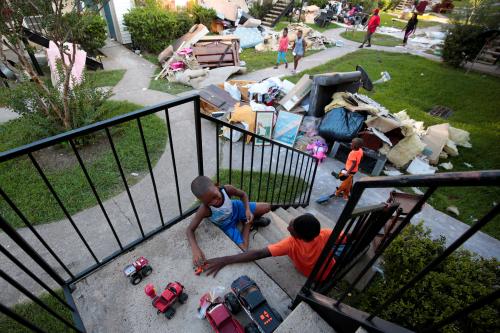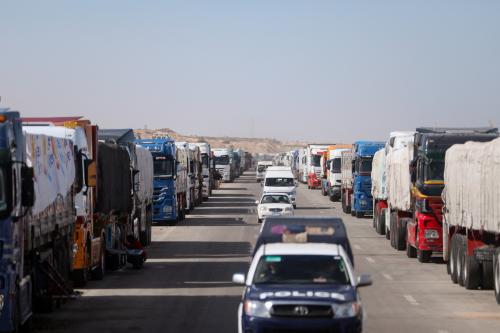In mid-October, a month after Hurricane Maria, most of Puerto Rico remains without electricity or safe drinking water, and still has serious food shortages, due to a combination of insufficient disaster response from the federal government and the sheer magnitude of the storm. Unfortunately, too much of the discussion about how to help Puerto Rico recover was focused on whether to waive the Jones Act, which became a strange cause célèbre and social media favorite among critics of the President’s response to the hurricane. The mistaken view that a temporary waiver of the Jones Act, which did occur, was based on an incomplete understanding of the actual problems facing the island and what exactly the Jones Act seeks to accomplish.
The feverish debate about whether to waive the Jones Act to expedite Puerto Rico’s disaster recovery was akin to considering what to do about a paper cut for a cancer patient. Its waiver was—and remains—irrelevant to the core humanitarian problems at hand and any needed reaction. The key problems, including insufficient and delayed federal resources, and a lack of means to distribute supplies on the island, have nothing to do with the Jones Act.
What is the Jones Act? Why is it relevant to Puerto Rico? And why are people Facebooking about it now? I know the answer to the first two questions as my childhood was filled with conversations of the application of the Jones Act to Puerto Rico and other parts of the United States (bet you never thought you’d read that sentence!). My mother was one of the leading legal experts on this unusual topic, having argued a case relating to it before the U.S. Supreme Court in the late 1970s.
The Jones Act of 1920 is the law that modernized the principal of cabotage to Puerto Rican shipping. Cabotage is the idea that that the provision of certain services within America is reserved exclusively to American companies. The idea dates back to the founding fathers and was incorporated as part of the second law passed by Congress, the Tariff of 1789. The Tariff of 1789 restricted maritime trade between two places within the United States to ships that are ‘U.S. Flagged’. This means the ship is built primarily in the U.S., has an American crew, and is owned by an American company. The Jones Act of 1920 modernized this long standing principal to the new reality of the growing American empire, expanding it to Puerto Rico, which, as a commonwealth, is part of the U.S. yet not a state.
Cabotage has a long history of support and adoption, often in transportation. Almost 50 nations have adopted some form of cabotage. It explains something you may never have thought about, which is why you can only fly domestic airlines when travelling within the U.S. Reserving domestic markets for domestic competition creates a set of clear winners: American companies, American workers, and often the military. The interest of the first two is straight forward. The military’s interest is rooted in their desire for a domestic supply chain to produce equipment. Military interests are especially relevant in shipping given the logistics in supporting troops abroad. The military uses American built ships and trained merchant mariners. One of the five military academies is the United States Merchant Marine Academy.
The feverish debate about whether to waive the Jones Act to expedite Puerto Rico’s disaster recovery was akin to considering what to do about a paper cut for a cancer patient.
Economists across the ideological spectrum oppose cabotage and the Jones Act, ranging from liberal Paul Krugman, to free-market libertarians at the CATO institute, to centrists at The Economist magazine. The common argument is that restricting competition raises costs and prices, and that the benefits of cabotage accrue to workers and owners of protected industries in America. The losses, opponents argue, are borne by the general public in the form of higher prices brought about by restricted competition. Given the standard benefits of trade and comparative advantage, the logic is that losses are greater than gains.
For Puerto Rico, this means that goods shipped to and from the island to and from the United States are slightly more expensive, while U.S. Flag ship owners, operators and crews benefit. Thus, in general times, there is a net negative economic impact for the island, although the magnitude is debatable. As the New York Federal Reserve found: “to the extent that it inhibits free trade, the Jones Act does indeed have a negative effect on the Puerto Rican economy, although the magnitude of the effect is unclear.”
My best estimate is that the overall impact on Puerto Rico is small and negative, but probably rising over time. It is small because shipping is just one part of the overall economy and the cost differential is not that large. In addition, as the Federal Reserve and others have found, having a protected industry increases stability and predictability, which itself adds value, counteracting part of the increased costs. Thus, overall there is cost, but it is not that great. It pales in comparison to the numerous structural problems plaguing the Puerto Rican economy pre-Maria: massive levels of government debt, high unemployment, a shrinking labor force, etc.
The impact of the Jones Act on Puerto Rico has likely risen over time as the number of American built ships has declined. In the 1950s, pre containerization, America was a commercial shipbuilding power building more than 1/3 of the world’s cargo volume. However, America’s domestic commercial shipbuilding industry has largely vanished and today American built ships carry only 1/3 of 1 percent of total cargo. While there are many factors at play, a key moment occurred in the 1980s when America stopped matching foreign nations’ shipbuilding subsidies. When foreign governments, particularly in Korea and later China, heavily subsidized their industry, American commercial ship building became uncompetitive. This trend also increased the importance of the Jones Act to the viability and value of the remaining American flagged ships.
The decline of American shipping overall has increased the value of the Jones Act for the military. As the Government Accountability Office found: “unrestricted competition from foreign-flag vessels could result in the disappearance of most U.S.-flag vessels in this trade, having a negative impact on the U.S. merchant marine and the shipyard industrial base that the Act was meant to protect.”
The Jones Act also benefits certain American workers, include those who build and repair ships, and merchant mariners. That is why the AFL-CIO and organized labor support the Jones Act. In this manner debate regarding the Jones Act resembles other policy debates regarding policies that negatively impact specific manufacturing, construction and other ‘quality blue collar’ jobs. The ship building yard and manufacturing factory have much in common.
Thus, the impact more broadly on America from a permanent change in the Jones Act is less clear than the direct economic impact for Puerto Rico. It may well be that ending the Jones Act for Puerto Rico, or, in the extreme case, for all of America, would be a net negative for the American economy, depending on the magnitude and importance placed on military capability. Given the very large degree of taxpayer support for high levels of military spending – which constitutes over half of the U.S. discretionary budget – and the growing concern regarding the broader social and economic consequences of declines in our industrial base, there are substantial reasons to suspect that the economic and political consensus supporting cabotage laws remains intact, if not growing.
Understanding what is at stake with the Jones Act makes clear that it is not relevant to short-term disaster relief. It is relevant to a longer-run argument between competing political and economic forces. How this argument became part of the disaster response debate is an example of the political mantra: never let a crisis go to waste.
After the speculation about the Jones Act’s supposed barrier to aid delivery spread virally online, the Department of Homeland Security was pressed by Rep. Nydia Valezquez (D-NY) to waive the Jones Act. Comparisons were made to prior waivers for hurricanes that landed in the continental states, fueling arguments that Puerto Rico was receiving second-class treatment. This fed into a broader narrative concerning whether Puerto Rico is more broadly treated equitably given its commonwealth status.
While that broad debate has great merit, focusing on the Jones Act component is wrong. It fails to appreciate the distinction between waivers based on oil and fuel shipping and cargo shipping. Those types of ships are not interchangeable and hurricanes to the Gulf Coast involved fuel and oil tanker shortages. As Keith Hennessy, director of the National Economic Council under President George W. Bush, stated regarding the waivers granted during Katrina and other times: “The direct benefits of a waiver were, in this case, small and diffuse. Waivers allowed 50K barrels per day here, and 100K barrels there, to arrive several days earlier than they would have otherwise. The waiver resulted in handfuls of short-term arrangements that moved fuel more expeditiously.” Puerto Rico, did not need oil tankers, nor were the problems about getting fuel to the port.
This did not stop members of the media, perhaps looking for quick stories, from publishing commentary that ignored the intricacies of shipping and disaster relief. Many outlets ran stories with scary headlines like “The Jones Act, the obscure 1920 shipping regulation strangling Puerto Rico, explained.”
The media frenzy then created an opportunity for long-time opponents of the Jones Act to capitalize. Senator John McCain (R-AZ) introduced legislation to permanently repeal the Jones Act, pressing his case for a permanent waiver on social media.
This confluence of narratives, a lack of detail and understanding of specific facts relating to shipping, and the perception that Puerto Rico was not being treated fairly helped lead to the Jones Act issue going viral. Going forward, the public will likely lose interest in the Jones Act as quickly as they gained interest. But should the issue re-enter public debates it’s worth noting that the economics and politics of Trump’s America First agenda align with the Jones Act and cabotage, more generally.
More broadly, those concerned with Puerto Rican disaster assistance in the short term, and how to restore the economy of Puerto Rico in the long term, should focus on the real economic problems. As my Brookings colleague Jason Miller correctly argues, this requires a long-term, sustained commitment of economic resources and assistance to the Commonwealth. It may also require rethinking the sustainability of the island as a commonwealth, or whether it should join the United States as the 51st state. Puerto Rico should not be used to press a long-standing economic debate regarding where to draw the line in which parts of our nation’s economy and military security are opened up to foreign competition. Critics of the President and those who wish to show support for a stronger disaster recovery ought to think twice before retweeting or Facebooking an enticing headline purporting to link obscure laws to topical disasters. They may be inadvertently supporting policies they actually oppose.








Commentary
What everyone got wrong about the Jones Act, hurricane relief, and Puerto Rico
October 25, 2017